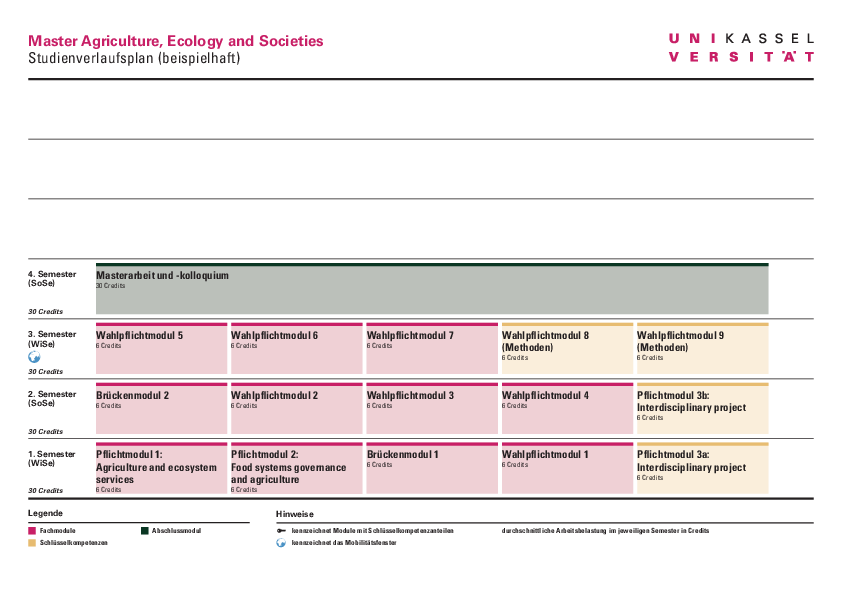Studienaufbau
Während des zweijährigen Masterstudiums müssen 120 Credits absolviert werden, aufgeteilt in:
- Agriculture and ecosystem services
- Food systems governance and agriculture
Für Studierende mit naturwissenschaftlichem Grundstudium:
- Research methods in social sciences
- History, societies and environment
Für Studierende mit sozialwissenschaftlichem Grundstudium:
- Research methods and data science in the life sciences, und
- entweder Priciples of organic farming oder Soil and plant sciences oder Organic livestock farming under temperate conditions
In Kleingruppen arbeiten die Studierenden an Forschungs- und/oder Transformationsprojekten zu konkreten Problemen des europäischen Ernährungs- und Agrarsystems und seiner globalen Verflechtungen. Jedes Projekt wird von zwei Lehrenden aus verschiedenen Disziplinen betreut.
Jedes Jahr werden unterschiedliche Projektthemen und -formate angeboten. Diese können auch gemeinsam von Studierenden und Dozenten entwickelt werden. Einige Beispiele:
- Colonialism, food culture, history and sustainability of rice cultivation in Africa.
- What is 'sustainable'? Conceptual developments between cultural histories & the natural sciences
- Transformation(s) of animal husbandry and human-animal interactions
- Food culture, animal welfare and animal ethics in the Ahle Worscht cluster in North Hesse
- The thawing permafrost of Siberia: Potentials and risks of agricultural development
- Organic agriculture and agroecology in North Africa: From competition between cash crops and agroecology to compatible systems?
- Impact of the new European conformity rules on third countries in the context of the reform of the organic farming regulation
- The German Supply Chain Act and its impact on the Global South: The example of Indonesia
- Alternative food networks and local context: historical and socio-economic comparisons between the EU and North Africa.
- Agroecological innovation, power relations and international markets: Lessons from Latin America
Vertiefungsmodule im Bereich Agriculture and Ecology:
Unconventional livestock and wildlife
- Livestock nutrition and feed evaluation under (sub)tropical conditions
- Livestock‐based sustainable land use
- Digitalization in livestock systems
- Management of (sub‐)tropical land use systems
- Organic food processing and food quality
- Applied statistical modelling
- GIS and remote sensing in agriculture
- Sustainable diets
- Modelling climate impacts on agroecosystems
- Organic agriculture in Europe (online module in cooperation with universitiies throughout the continent)
- Ecology and agroecosystems
- Organic cropping systems under temperate and (sub)tropical conditions
- Soil and water
- Agrobiodiversity and plant genetic resources in the tropics
- Nutrient dynamics, experimental design and statistical modelling
- Digitalization in agriculture
- Biochar for Environmental Management
- Soil‐plant interactions
Vertiefungsmodule im Bereich Society and Environment:
- Critical perspectives on the global food system
- Participatory research methods for sustainability
- EU policies, organic farming and food system transformation
- Management and management accounting
- Sustainability‐oriented environmental social science
- Climate change governance and one health
- Marketing research
- International organic food markets and marketing
- Supply chain management
- Spatial Dimensions of Sustainability Transitions
- Sustainable behaviour and governance
- Rural Sociology
- Socio-ecology in livestock production systems
- Methods of sociology and humanities
- Global political economy and development
- Philosophy of sciences
- Philosophy of environment and society
Individuell können die Studierenden auch aus dem erweiterten Studienangebot der Universität Kassel wählen. Einschlägige Kurse an unseren Partnerhochschulen und darüber hinaus können ebenfalls anerkannt werden. Diese werden in der Regel während eines Austauschsemesters im 3. Semester belegt.
Das Sprachenzentrum bietet Kurse in 11 Sprachen an, viele davon spezialisiert auf den Ausbau akademischer und fachsprachlicher Fähigkeiten.
Im 4. Semester entwickeln die AGES-Studierenden ein Forschungsprojekt zu einem Thema ihrer Wahl. In der daraus entstehenden Masterthese verbinden sie die im Studium erlernten Theorien und Ansätze, dokumentieren Methodensicherheit und -reflexion, stellen eigenständig wissenschaftlich begründete Thesen auf und reflektieren diese vor dem Hintergrund des internationalen Forschungsdiskurses. Der Fortschritt des Thesenprojekts wird zweimal präsentiert:
- Im Studienkolloquium stellen die Studierenden die methodischen Grundlagen sowie die Planung und erste Erkenntnisse ihrer Arbeit vor.
- Im Abschlusskolloquium wird die fertige These präsentiert und mit Wissenschaftlern und idealerweise auch mit Praktikern (je nach Projektthema) aus unterschiedlichen Disziplinen diskutiert.
Angesichts des breiten Spektrums und der geringen Pflichtanteile bietet AGES den Studierenden die Möglichkeit, proaktiv ihr eigenes berufliches Profil aufzubauen. Im Rahmen unseres obligatorischen Mentoring-Programms werden sie dabei von Professoren 1:1 unterstützt.
Mögliche thematische Cluster für eine Spezialisierung sind, z.B.:
- Agro-food system governance:
- Focus on themes such as Institutional Economics, Institutions in the Food System, Rural Sociology, Political Economy and Development, Regional Planning and EU Institutions.
- Social Movements and Advocacy:
- Focus on themes such as Development Studies, Participatory Research Methods, Labor and Social Movement Studies, Human-Nature and Human-Animal Studies, Environmental Ethics, Gender Studies, and Social & Cultural History.
- Management of agri-food transitions:
- Focus on themes such as Sustainability Management, International Organic Food Markets and Marketing, Sustainable Diets, Supply Chain Management, Food Quality and Processing, and Consumer Studies.
- Sustainable Agro-Ecosystem Design:
- Focus on themes such as Ecological Plant and Animal Science, Agroecosystem Analysis and Modelling, Agrobiodiversity, Regional Planning, Pest Management, Water Management and Agroforestry, among many others.
